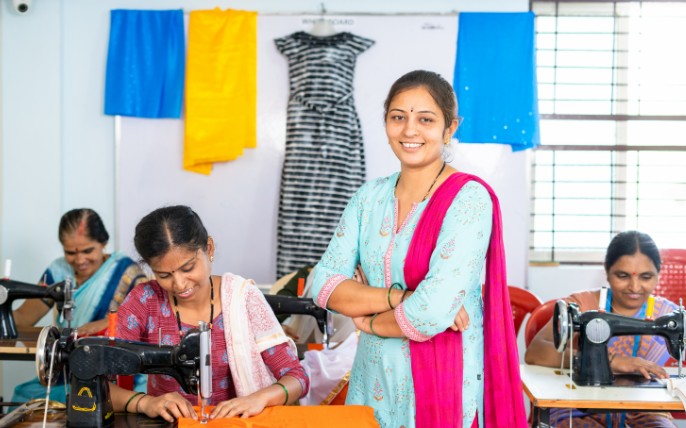Empowering Women's Craft: The Heartbeat of Sustainable Toy-Making
The world of play is being beautifully transformed by the dedicated hands of women artisans who breathe life into sustainable toys that celebrate diversity and cultural richness. These talented creators are crafting multicultural toys that not only delight children with their vibrant stories but also promote eco-friendly practices by using sustainable materials. Through their art, they weave the intricate beauty of South Asian heritage into each handmade toy, offering children a gateway to a world filled with cultural awareness and understanding. As we explore the profound impact of these artisans, it becomes evident how their labor of love fosters a nurturing environment for both play and learning. Join us in appreciating and supporting their invaluable craftsmanship by choosing toys that enrich lives and sustain our planet. 🌍❤️
Learn more about the inspiring stories of women artisans.
Women Artisans: Crafting with Purpose
Women artisans are at the forefront of creating unique, sustainable toys that tell rich stories and celebrate cultural diversity. Their craftsmanship empowers communities and preserves traditional skills while supporting eco-friendly practices. By choosing toys crafted by these talented women, consumers can contribute to a more inclusive and sustainable future.
Celebrating Cultural Diversity
Women artisans are pivotal in crafting toys that celebrate diversity. These toys are more than just playthings; they are cultural ambassadors. They introduce children to a world of different traditions and stories. Multicultural toys help build cultural awareness by representing varied ethnic backgrounds and experiences.
- Real-world Example: Consider the traditional Etikoppaka wooden toys from India, which showcase the vibrancy of South Asian art. Read more about their impact.
These toys not only entertain but also educate. They provide children with a broader perspective, fostering acceptance and understanding from a young age.
Empowering Through Craftsmanship
Craftsmanship is a powerful tool for empowerment. It provides women artisans with opportunities to sustain their livelihoods and express their creativity. This empowerment is vital, offering women a voice in the marketplace and a chance to showcase their talents globally.
- Case Study: A rural artisan community in India has gained recognition for its skill in creating handcrafted toys. This endeavor has improved their economic status and preserved cultural heritage.
Actionable Advice:
- Support handmade toys to empower women artisans.
- Encourage storytelling through toys to promote cultural understanding.
Empowering women through their craft is about more than financial independence; it’s about cultural preservation and personal growth.
The Beauty of Multicultural Toys
Multicultural toys have the power to bring the world into a child's playroom. They spark curiosity and inspire learning about different cultures, creating a more inclusive environment for children.
South Asian Heritage in Play
South Asian heritage is beautifully encapsulated in handcrafted toys. These toys often feature intricate designs and vibrant colors, reflective of the region's rich cultural tapestry.
Real-world Example: Toys such as traditional dolls dressed in South Asian attire offer children a glimpse into regional traditions. They serve as educational tools that open dialogues about cultural differences and similarities.
- Key Insight: Exposure to such toys can enhance a child’s understanding and appreciation of diverse cultures, promoting inclusivity from an early age.
Multicultural toys are crafted with purpose, aiming to educate as much as entertain. By incorporating South Asian elements, they celebrate a heritage rich in history and artistry.
Supporting Women and Sustainability

Supporting women artisans goes hand in hand with promoting sustainability. By choosing toys made under fair trade practices, consumers can make a significant impact.
Fair Trade Practices
Fair trade ensures that artisans receive fair compensation for their work, which is crucial for their economic well-being.
Key Takeaways:
- Fair trade supports ethical labor practices.
- It helps maintain traditional craft techniques.
- Case Study: A cooperative of women artisans in rural India has thrived under fair trade principles, improving their socio-economic status and community well-being.
- Quote: "Fair trade transforms lives by valuing the hands that craft each unique piece." Learn more.
Building a Community of Conscious Consumers
Conscious consumers are those who make purchasing decisions based on ethical and environmental considerations.
- Statistics:
- 68% of consumers are willing to pay more for sustainable products.
- 54% of consumers want brands to take a stand on social issues.
Actionable Advice:
- Educate yourself on the brands and artisans you support.
- Choose products that align with your values.
Building a community of conscious consumers supports not only women artisans but also efforts toward a sustainable future. By making informed choices, you can contribute to a world where diversity and environmental responsibility are celebrated. 🌟

